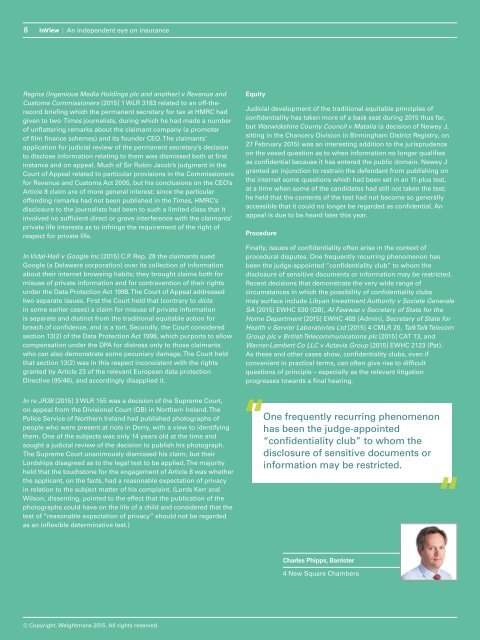InView Autumn/Winter 2015
Welcome to the second issue of InView where we focus on the highly topical and hugely important issues surrounding technology, including cyber risks.
Welcome to the second issue of InView where we focus on the highly topical and hugely important issues surrounding technology, including cyber risks.
- No tags were found...
You also want an ePaper? Increase the reach of your titles
YUMPU automatically turns print PDFs into web optimized ePapers that Google loves.
8 <strong>InView</strong> | An independent eye on insurance<br />
Regina (Ingenious Media Holdings plc and another) v Revenue and<br />
Customs Commissioners [<strong>2015</strong>] 1 WLR 3183 related to an off-therecord<br />
briefing which the permanent secretary for tax at HMRC had<br />
given to two Times journalists, during which he had made a number<br />
of unflattering remarks about the claimant company (a promoter<br />
of film finance schemes) and its founder CEO. The claimants’<br />
application for judicial review of the permanent secretary’s decision<br />
to disclose information relating to them was dismissed both at first<br />
instance and on appeal. Much of Sir Robin Jacob’s judgment in the<br />
Court of Appeal related to particular provisions in the Commissioners<br />
for Revenue and Customs Act 2005, but his conclusions on the CEO’s<br />
Article 8 claim are of more general interest: since the particular<br />
offending remarks had not been published in the Times, HMRC’s<br />
disclosure to the journalists had been to such a limited class that it<br />
involved no sufficient direct or grave interference with the claimants’<br />
private life interests as to infringe the requirement of the right of<br />
respect for private life.<br />
In Vidal-Hall v Google Inc [<strong>2015</strong>] C.P. Rep. 28 the claimants sued<br />
Google (a Delaware corporation) over its collection of information<br />
about their internet browsing habits; they brought claims both for<br />
misuse of private information and for contravention of their rights<br />
under the Data Protection Act 1998. The Court of Appeal addressed<br />
two separate issues. First the Court held that (contrary to dicta<br />
in some earlier cases) a claim for misuse of private information<br />
is separate and distinct from the traditional equitable action for<br />
breach of confidence, and is a tort. Secondly, the Court considered<br />
section 13(2) of the Data Protection Act 1998, which purports to allow<br />
compensation under the DPA for distress only to those claimants<br />
who can also demonstrate some pecuniary damage. The Court held<br />
that section 13(2) was in this respect inconsistent with the rights<br />
granted by Article 23 of the relevant European data protection<br />
Directive (95/46), and accordingly disapplied it.<br />
Equity<br />
Judicial development of the traditional equitable principles of<br />
confidentiality has taken more of a back seat during <strong>2015</strong> thus far,<br />
but Warwickshire County Council v Matalia (a decision of Newey J,<br />
sitting in the Chancery Division in Birmingham District Registry, on<br />
27 February <strong>2015</strong>) was an interesting addition to the jurisprudence<br />
on the vexed question as to when information no longer qualifies<br />
as confidential because it has entered the public domain. Newey J<br />
granted an injunction to restrain the defendant from publishing on<br />
the internet some questions which had been set in an 11-plus test,<br />
at a time when some of the candidates had still not taken the test;<br />
he held that the contents of the test had not become so generally<br />
accessible that it could no longer be regarded as confidential. An<br />
appeal is due to be heard later this year.<br />
Procedure<br />
Finally, issues of confidentiality often arise in the context of<br />
procedural disputes. One frequently recurring phenomenon has<br />
been the judge-appointed “confidentiality club” to whom the<br />
disclosure of sensitive documents or information may be restricted.<br />
Recent decisions that demonstrate the very wide range of<br />
circumstances in which the possibility of confidentiality clubs<br />
may surface include Libyan Investment Authority v Societe Generale<br />
SA [<strong>2015</strong>] EWHC 530 (QB), Al Fawwaz v Secretary of State for the<br />
Home Department [<strong>2015</strong>] EWHC 469 (Admin), Secretary of State for<br />
Health v Servier Laboratories Ltd [<strong>2015</strong>] 4 CMLR 20, TalkTalk Telecom<br />
Group plc v British Telecommunications plc [<strong>2015</strong>] CAT 13, and<br />
Warner-Lambert Co LLC v Actavis Group [<strong>2015</strong>] EWHC 2123 (Pat).<br />
As these and other cases show, confidentiality clubs, even if<br />
convenient in practical terms, can often give rise to difficult<br />
questions of principle – especially as the relevant litigation<br />
progresses towards a final hearing.<br />
In re JR38 [<strong>2015</strong>] 3 WLR 155 was a decision of the Supreme Court,<br />
on appeal from the Divisional Court (QB) in Northern Ireland. The<br />
Police Service of Northern Ireland had published photographs of<br />
people who were present at riots in Derry, with a view to identifying<br />
them. One of the subjects was only 14 years old at the time and<br />
sought a judicial review of the decision to publish his photograph.<br />
The Supreme Court unanimously dismissed his claim, but their<br />
Lordships disagreed as to the legal test to be applied. The majority<br />
held that the touchstone for the engagement of Article 8 was whether<br />
the applicant, on the facts, had a reasonable expectation of privacy<br />
in relation to the subject matter of his complaint. (Lords Kerr and<br />
Wilson, dissenting, pointed to the effect that the publication of the<br />
photographs could have on the life of a child and considered that the<br />
test of “reasonable expectation of privacy” should not be regarded<br />
as an inflexible determinative test.)<br />
One frequently recurring phenomenon<br />
has been the judge-appointed<br />
“confidentiality club” to whom the<br />
disclosure of sensitive documents or<br />
information may be restricted.<br />
Charles Phipps, Barrister<br />
4 New Square Chambers<br />
© Copyright. Weightmans <strong>2015</strong>. All rights reserved.




